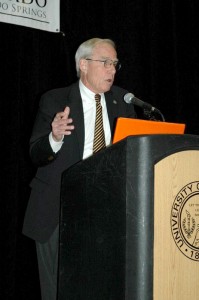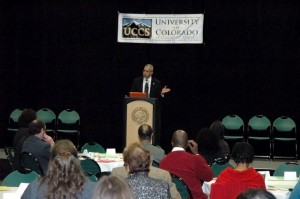With references ranging from famous basketball coaches to noted social scientists and U.S. Supreme Court justices, Columbia University’s provost delivered a personal and compelling roadmap to improving the academic performance of minority students Friday morning.
Claude Steele, provost, Columbia University and a professor of psychology, delivered the keynote address at the CU Diversity Summit hosted by UCCS at Berger Hall.
During a morning address that preceded an afternoon of detailed discussions among the more than 150 participants, Steele explained the role of stereotypes in academic performances and how universities can help students be successful.
 “It’s one thing to numerically integrate a setting – a classroom, a school, a university,” Steele said. “It’s another thing to have that setting be the place where everybody feels comfortable and able to flourish effectively in the environment. It’s a fundamental American challenge.”
“It’s one thing to numerically integrate a setting – a classroom, a school, a university,” Steele said. “It’s another thing to have that setting be the place where everybody feels comfortable and able to flourish effectively in the environment. It’s a fundamental American challenge.”
Steele intertwined personal stories with the results of studies that show the impact of stereotyping on performance. His examples included stereotypes of racism, sexism and ageism that can subconsciously prevent individuals from excelling.
His examples included studies where African-American men are given tests and told they are intelligence tests. The term “intelligence test” can cue internal stereotypes and results in poor scores. In contrast, calling the tests “puzzles” improved performance. He shared similar studies with women undertaking complicated math tests and the cues given before the exams were administered.
“There are a lot of little things that can be done on campuses that begin to concert a sense of this safety,” Steele said. “At this age, I’m not sure there is a silver bullet that will automatically reduce underperformance but there are a lot of little things that if you add them up you can reduce it.”
 Some of Steele’s suggestions included:
Some of Steele’s suggestions included:
- Student feedback. Steele suggested making assignments challenging but affirming student ability to meet those challenges and avoiding superficial praise. “I suggest language such as ‘We have high standards here and I think you can meet those standards, here’s the critical feedback.’”
- Critical mass. Having a diverse campus is important to making students feel comfortable and contributes to success, he said.
- Role models and existence proofs. Students need to have examples of people near them with whom they can identify and who illustrate success, Steele said.
- Representing intellectual ability as incremental. Steele suggested reminding students that the brain is expendable and helping them deal with frustration as they learn new materials and overcome stereotypes.
Steele was introduced by Chancellor Pam Shockley-Zalabak who told of the affect that Steele’s book, “Whistling Vivaldi: And Other Clues to How Stereotypes Affect Us” had on her personally and her encouragement of others to read it. CU President Bruce Benson opened the session, repeating CU’s commitment to diversity and encouraging learning of new ways to communicate that commitment.
The day’s events were organized by Kee Warner, associate vice chancellor for diversity and inclusiveness.
— Photos by Tom Hutton


Leave a Reply